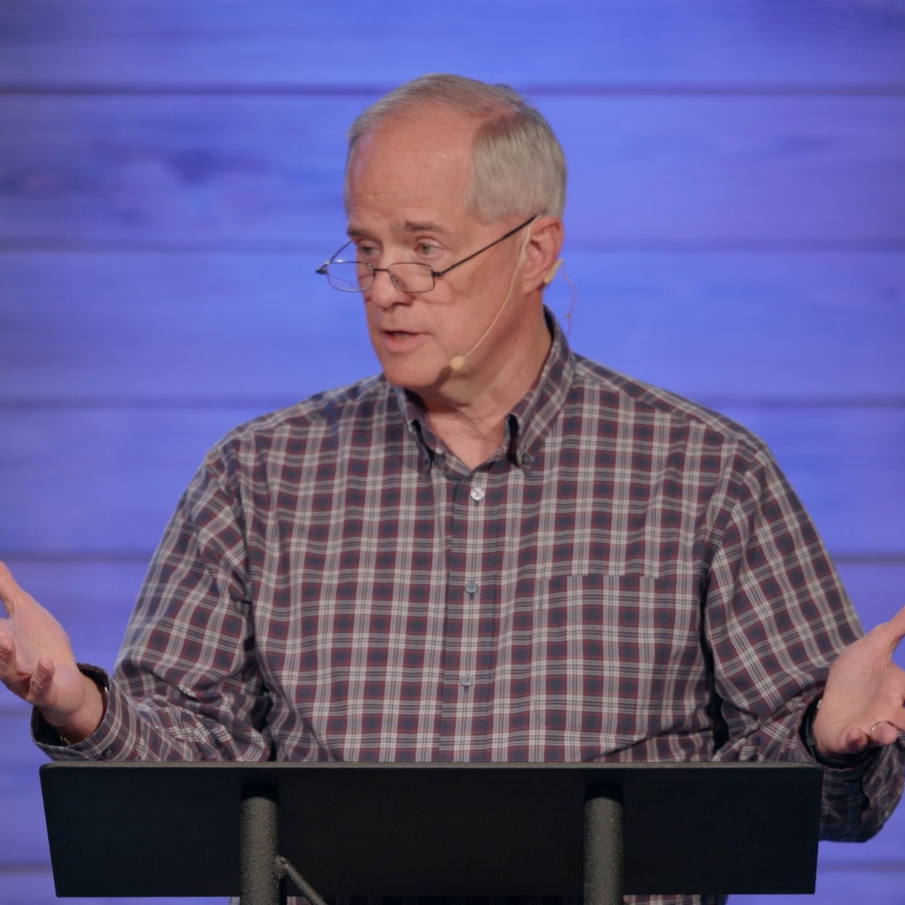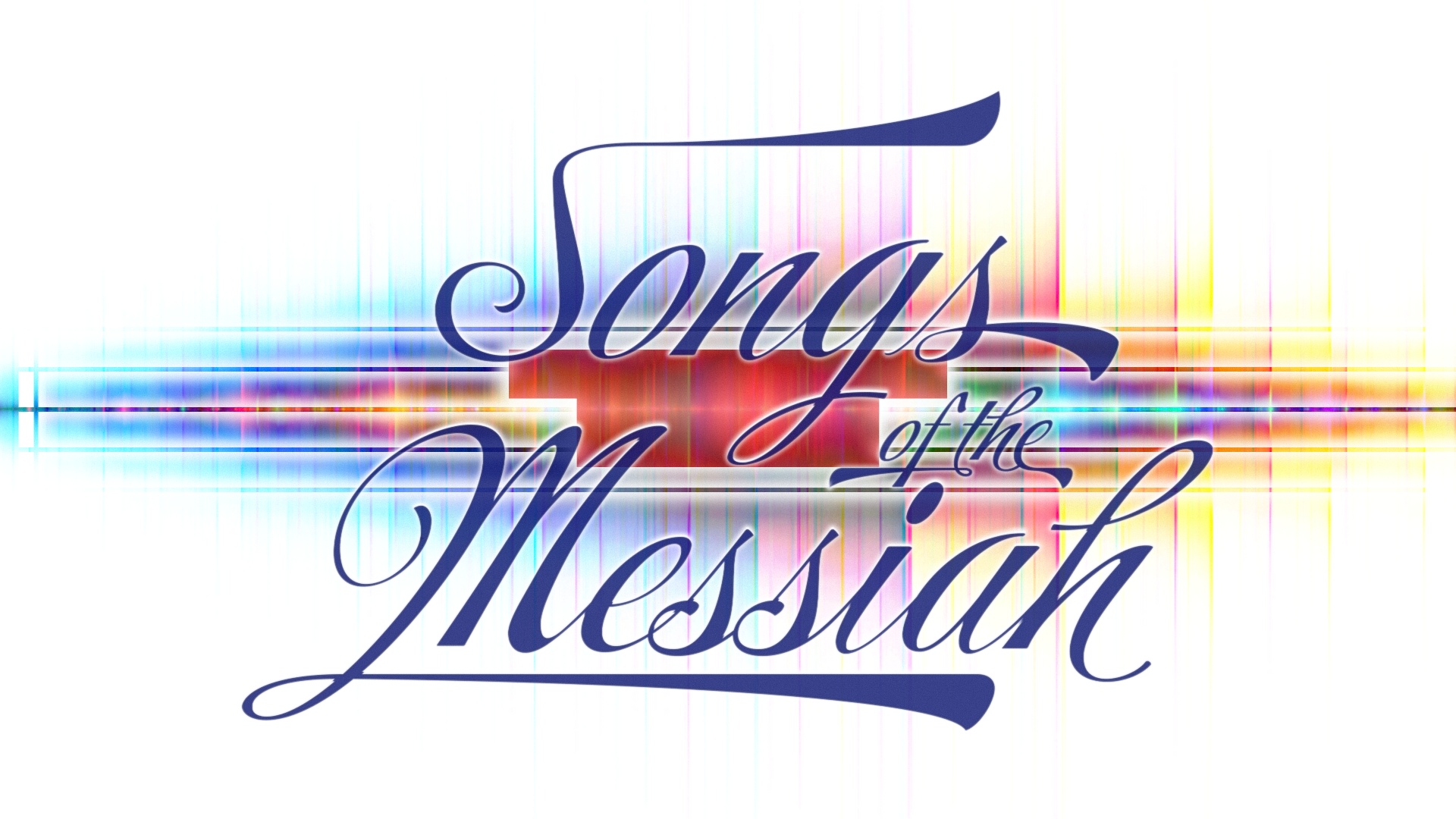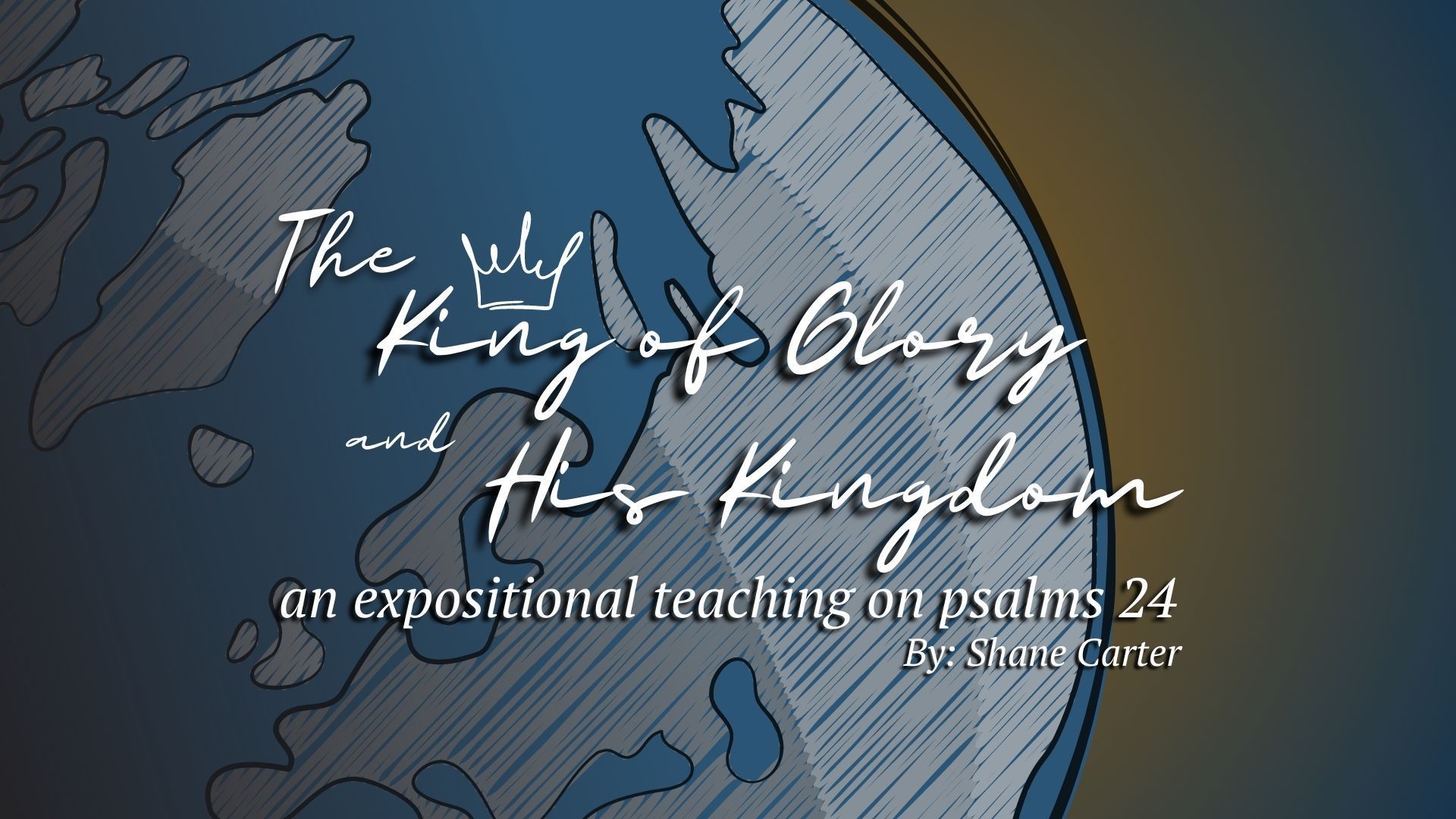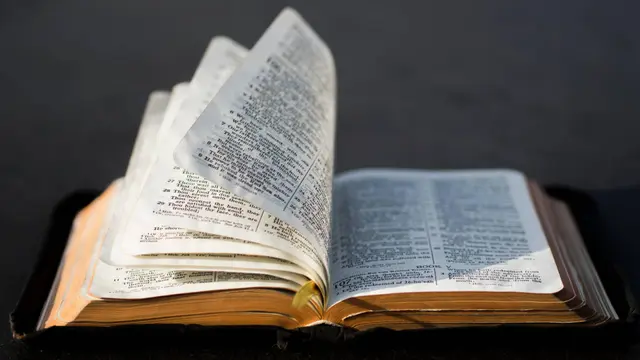MANUSCRIPT
Welcome back to our spring midweek series, “Songs of the Messiah”...we’re finding Jesus in the Psalms...so far we’ve covered Psalms 8, 16, 22, and 34...tonight plus two more to go!
In John 12.21, let’s recall John’s record of our theme verse...20 Now among those who went up to worship at the feast were some Greeks. 21 So these came to Philip, who was from Bethsaida in Galilee, and asked him, “Sir, we wish to see Jesus.”
That’s our goal in life...to help people see Jesus...in the Word and in us...and He is very evident in this marvelous book…
As I said, we’ll cover some background material each week...tonight, I wanted to discuss another element within the book...early on I mentioned that there are books within the book of Psalms...in English translations, they are simply called Books I through V...but when they are carefully examined, there is a pattern and plan to the content...while scholars’ evaluations vary slightly, this outline is credited to Dr. O. Palmer Robertson:
Book I (3-41): Confrontation – driven by the conflict between the Almighty Creator God and the adversary, God purposed from eternity to redeem for Himself a people, freed from iniquity and saved by the work of God’s savior, the Messiah, who was born of the nation Israel from the line of David; as David writes this first book, the psalms here focus on the confrontation between David, the ancestor of the Messiah, as he confronts the enemies opposing the work of God and seeks to establish God’s kingdom of righteousness and peace…
Book II (42-72): Communication – after the constant conflict of Book I, now the focus changes to a celebration of the kingship of God and His Messiah, and the communication of that kingship to the nations; the collection is anchored by psalms 61 through 64 as the Messianic King speaks, followed by psalms 65 through 68 affirming the reign of the King; there is less confrontation and more dialogue with others throughout the shorter Book II…
Book III (73-89): Devastation – now the book takes an unexpected turn...from the establishment of the Davidic kingdom despite opposition from enemies in Book I, and the extension of the communication of that kingdom throughout the nations, now the nation of Israel is attacked and overwhelmed by their enemies...the focus changes from an individual to a corporate perspective as the nation suffers...Psalm 89.38-42 is strikingly different from the psalms of the early books...
38 But now you have cast off and rejected;
you are full of wrath against your anointed.
39 You have renounced the covenant with your servant;
you have defiled his crown in the dust.
40 You have breached all his walls;
you have laid his strongholds in ruins.
41 All who pass by plunder him;
he has become the scorn of his neighbors.
42 You have exalted the right hand of his foes;
you have made all his enemies rejoice.
Book IV (90-106): Maturation – from the rehearsal of the destruction and exile of the nation, again the focus changes to a maturing perspective of a people chastened by exile into Assyria and Babylon...God has disciplined them but has also raised them up...Robertson describes it this way... this book represents a more mature perspective on the “permanent dwellingplace” and the “perpetual dynasty” promised in the Davidic covenant. Book IV concentrates on the ancient reality that God himself is his people’s dwelling place and that Yahweh is their King. ... a perspective that has been fostered by stretching the people’s faith through their experience of the exile. ... David’s dynasty will eventually be realized only through its perfected union with God’s rule. Now the people are prepared through suffering for the work of reestablishing the kingdom in the land of Judah...
Book V (107-150): Consummation – having moved from confrontation to communication, to devastation and through maturation, the story of the journey of God’s people through the Psalms finishes with a carefully constructed collection of 44 psalms with a focus characterized by the dominant word, Hallelujah! ... the book contains a grouping of hallelujah psalms (111-117), a messianic/torah pair (118-119), the songs of ascent we discussed last week that emphasized Jerusalem as Zion, the dwelling place of God; and the finale of praise psalms (146-150), concluding with the last verse of the book, Psalm 150.6... Let everything that has breath praise the Lord! Praise the Lord!
Tonight, we turn to Psalm 40, which is very near the closing of Book I, the confrontation psalms...this is one of the handful of psalms which is considered messianic by virtually all scholars who recognize messianic psalms at all...by both content and NT reference, this psalm has a clear focus on Jesus...we’re going to examine the psalm in two parts, which happen naturally in the text...verses 1 through 10 are a hymn of thanksgiving, while verses 11 through 17 are a lament...backwards of what we might expect...let’s jump into the word!
Thanksgiving
Before we begin with verse 1, let me go back to Psalms 37 through 39...
Psalm 37.7a Be still before the Lord and wait patiently for him;
Psalm 38.15 But for you, O Lord, do I wait; it is you, O Lord my God, who will answer.
Psalm 39.7 And now, O Lord, for what do I wait? My hope is in you.
Now in Psalm 40.1-3, David declares that his patient waiting for God has been answered...
1 I waited patiently for the Lord;
he inclined to me and heard my cry.
2 He drew me up from the pit of destruction,
out of the miry bog,
and set my feet upon a rock,
making my steps secure.
3 He put a new song in my mouth,
a song of praise to our God.
Many will see and fear,
and put their trust in the Lord.
The language of “waited patiently” is considered by many to be lacking the true intensity of the word...perhaps it could be compared to a wife or husband anxiously awaiting the return of the spouse from a long trip...the kind of waiting that involves standing and looking out the window into the night for the headlights of the car...David needed to see the Lord show up, and the Lord does...
Look at the verbs in David’s description...
“Inclined to me” – God leaned down and paid complete attention to David...He leaned down as a parent would to a child...as you parents have to your children...
He “heard my cry”...literally turned His ear to me, as one might who wants to make sure that the one speaking is clearly heard...
He “drew me up” from the pit of destruction...also translated as slimy pit, horrible pit, miry bog, pit of despair, miry clay...you get the picture...it’s reminiscent of the time when Jeremiah was thrown by his enemies into a mud-filled cistern with no water, and Jeremiah sank into the mud...this image of a bog or swamp is taken up by John Bunyan in The Pilgrim’s Progress directly from this verse, and he calls it the slough of despond, or pit of despair...it’s one of the first hazards that Christian faces on his journey from the City of Destruction to the Celestial City, and it has taken in many travelers...only by God’s help can we escape it...
He “set my feet on a rock”...a sturdy and safe place to stand...there’s all the difference in the world between a pit filled with mud and solid granite, where a person can securely stand and walk with confident steps...
He “put a new song in my mouth” ... this is a common phrase in Psalms, it’s used once in Isaiah, and twice in the NT, both in Revelation...5.9-10 says this:
9 And they sang a new song, saying,
“Worthy are you to take the scroll
and to open its seals,
for you were slain, and by your blood you ransomed people for God
from every tribe and language and people and nation,
10 and you have made them a kingdom and priests to our God,
and they shall reign on the earth.”
The result of God’s deliverance is that many will see and fear and trust in the Lord...
David now alludes to Psalm 1 as he says “blessed is the man...”
4 Blessed is the man who makes
the Lord his trust,
who does not turn to the proud,
to those who go astray after a lie!
5 You have multiplied, O Lord my God,
your wondrous deeds and your thoughts toward us;
none can compare with you!
I will proclaim and tell of them,
yet they are more than can be told.
Trusting in God is the path to blessing...trusting in the proud, the arrogant, those who pursue lies as if they were truth, who go astray from the path of righteousness, is the express lane to destruction...when I read this verse, I honestly thought of politics...don’t ever think that the way to being blessed of God is to follow after people who say they are the answer to the world’s problems...they are not the answer...that’s the ancient lie, that people can fix themselves, that we know what’s best and right, that we are wise, that we are not the problem, we’re the solution...that’s utterly and lethally false thinking...
I recommend to you the book by G.K. Chesterton entitled “Orthodoxy” – in the foreward by Philip Yancey, Yancey recalls when the London Times requested writers submit essays on the topic “What’s Wrong with the World” ... Chesterton answered, “Dear Sirs: I am. Sincerely yours, G. K. Chesterton”
That’s the best answer yet to what’s wrong with the world...we are...and if any other human being says he or she is the answer, you know right away they’re lying...
Instead, our hope is in God, not man...the Lord’s wondrous works in our past, and His thoughts about us for our future...the Hebrew word for “thoughts” is ‘ma-haash’-a-bah’ – it means “plans,” a series of steps set out to accomplish a goal or objective...David says that the Lord has “thoughts” or “plans” toward us...He’s moving us toward His purposes, purposes which we can only barely understand...but we can rest on the truth that they are both good and glorious...
It’s rightly said that no one can compare to the Lord...we preach, teach, write, and sing, but we can barely begin to tell of the wonders of His love!
Now we come to the passage that makes this a messianic psalm verses 6 through 8...
6 In sacrifice and offering you have not delighted,
but you have given me an open ear.
Burnt offering and sin offering
you have not required.
7 Then I said, “Behold, I have come;
in the scroll of the book it is written of me:
8 I delight to do your will, O my God;
your law is within my heart.”
What a fascinating passage...these short three verses have puzzled Bible students through the centuries...they were written by David, but seem to make little sense coming from him...look at verse 6...given the Law of God regarding the requirement for sacrifices and offerings, it seems contradictory that David would say that, unless there is a deeper truth here...the contrast to the Levitical law is a righteous One who comes to God with an “open ear”...the word for “open” is to “dig”...literally, ‘ears you have dug for me’...with the ear standing as a part for the whole of the person, we begin to see what is being said... here...God is providing for Himself a saviour-King, David in his day but ultimately David’s Greater Son, Jesus Christ...Hamilton makes this observation at this point:
David’s point in Ps 40:6 is that Yahweh wants obedience, not sacrifice. Sacrifice makes provision for those unsuccessful at obedience. Obedience is Yahweh’s first choice, and sacrifice is provided for those who try to obey and fail. David’s statement that Yahweh dug him an ear means that Yahweh has enabled David to hear his word and obey.
In verse 7, 7 Then I said, “Behold, I have come; in the scroll of the book it is written of me: David speaks of himself, but in characteristic prophetic fashion, overreaches in what he says to more clearly point to his Lord, Jesus of Nazareth, the One still to come, Who truly came as He was called by the Father, and as He was prophesied from Genesis to Malachi, as Jesus Himself said in Luke 24.44: 44 Then he said to them, “These are my words that I spoke to you while I was still with you, that everything written about me in the Law of Moses and the Prophets and the Psalms must be fulfilled.”
Verse 8 describes exactly the delight of the Lord... to do your will, O my God; Your law is within my heart.” David very imperfectly fit this description...but Jesus perfectly fulfilled all the will of His Father...the Torah of God was fully within His heart, and completely lived out in His full obedience to the command of God the Father...
To make this point, look at the two uses of the word “delight” ... God doesn’t delight in sacrifices and offerings disconnected from obedience and submission...instead, what delights the heart of the Father is a person who does His will, powered by a heart filled to overflowing with His word...and the One who did that perfectly was Jesus...
We see the author of Hebrews reach back to Psalm 40 to help explain the futility of the OT sacrificial system and the absolute necessity of the work of Messiah… here’s what Hebrews 10.4-10 says...
4 For it is impossible for the blood of bulls and goats to take away sins.
5 Consequently, when Christ came into the world, he said,
“Sacrifices and offerings you have not desired,
but a body have you prepared for me;
6 in burnt offerings and sin offerings
you have taken no pleasure.
7 Then I said, ‘Behold, I have come to do your will, O God,
as it is written of me in the scroll of the book.’”
8 When he said above, “You have neither desired nor taken pleasure in sacrifices and offerings and burnt offerings and sin offerings” (these are offered according to the law), 9 then he added, “Behold, I have come to do your will.” He does away with the first in order to establish the second. 10 And by that will (the will of God) we have been sanctified through the offering of the body of Jesus Christ once for all.
This NT passage gives the complete sense of the intent of the messianic prophecy from Psalm 40...through the voice of David, the Holy Spirit magnified the Person and Work of Christ as the perfect sacrifice, the One who willingly came to fulfill the Law and purchase people for God...by His flawless life and atoning death, Jesus did away with the old covenant of Law and established the second and final covenant of Grace, paid for by His own blood...church, we need to deeply understand this truth...no longer do we live by the ritual patterns of the Law, that can never take away sin...instead, we live by grace alone, through faith alone, in Christ alone, understood through the Scripture alone, for the glory of God alone...amen!
And what does a God-honoring person do who is filled with the Law of God? They proclaim His greatness...
9 I have told the glad news of deliverance
in the great congregation;
behold, I have not restrained my lips,
as you know, O Lord.
10 I have not hidden your deliverance within my heart;
I have spoken of your faithfulness and your salvation;
I have not concealed your steadfast love and your faithfulness
from the great congregation.
Someone who has been so greatly blessed by God has a story to tell of God’s deliverance, faithfulness, salvation, and steadfast love...and like David, and Jesus, we are to be witnesses to the goodness and glory of the Lord...even King Nebuchadnezzar of Babylon knew this truth: Daniel 4.2 2 It has seemed good to me to show the signs and wonders that the Most High God has done for me. If Nebuchadnezzar can praise the Lord, how much more should we!
Now we turn to the lament...
Lament
David has anxiously waited for the Lord, and finally the Lord has answered his call, blessing him, and putting a new song in his mouth to sing praises to God and witness to His goodness...but seemingly as soon as David ends this thanksgiving hymn, he turns around and begins a lamentation...
11 As for you, O Lord, you will not restrain
your mercy from me;
your steadfast love and your faithfulness will
ever preserve me!
12 For evils have encompassed me
beyond number;
my iniquities have overtaken me,
and I cannot see;
they are more than the hairs of my head;
my heart fails me.
David has great confidence that God will not withhold, or restrain, His mercy, especially since David has known God’s mercy so recently...he has experienced God’s steadfast love, His ‘he-sed’ and His faithfulness...
David expresses two causes for his lamentation, one external and one internal...
From without, he is surrounded by “evils”...these threats could be those within his own kingdom, such as his son Absalom, or the servants of Saul, or the Philistines, or others who would betray and try to overthrow him as king over Israel...
From within, he confessed his iniquities before the Lord, speaking of them as if they were pursuing him as his enemies did...they have “overtaken” me...David says that his sins number more than the hairs on his head...as for that list, we know of several instances in Scripture, including his affair with Bathsheba, his murder of her husband, Uriah, and the numbering of Israel done against God’s will...and there were surely more that we don’t know anything about...
He declares that as a result of both threats – external and internal – he has no strength left, that his heart fails within him...and he begs for the Lord to quickly deliver him from both his enemies and his sins...
David’s only hope in this lament, just as it was in the thanksgiving hymn, is not David’s own righteousness, but God’s faithfulness to him...we see that in verses 13 through 15, which, interestingly, are almost exactly duplicated in Psalm 70...David cries out to God to turn back those who sought to harm him, who would be thrilled if David were overcome and defeated or even killed...
13 Be pleased, O Lord, to deliver me!
O Lord, make haste to help me!
14 Let those be put to shame and disappointed altogether
who seek to snatch away my life;
let those be turned back and brought to dishonor
who delight in my hurt!
15 Let those be appalled because of their shame
who say to me, “Aha, Aha!”
David now turns to consider the righteous as he finishes this lamentation on a somewhat positive note...
16 But may all who seek you
rejoice and be glad in you;
may those who love your salvation
say continually, “Great is the Lord!”
17 As for me, I am poor and needy,
but the Lord takes thought for me.
You are my help and my deliverer;
do not delay, O my God!
It’s true: the Lord takes thought of His own, for He is truly their Help and their Deliverer!
Application
What do we learn about Jesus from Psalm 40?
The Lord answers prayer...ours is to patiently wait, even though it might take longer than we want...
Believers will praise the Lord! Remember Ps 34.1? I will bless the Lord at all times, and His praise will continually be in my mouth...now David testifies that the Lord gave him a new song of praise to our God...
Put your trust in the Lord, not in the proud and arrogant...Jesus is faithful!
Our salvation is secured in Jesus Christ, the One who came to do the Father’s will by abolishing the covenant of Law and establishing the covenant of Grace...
When your enemies and your sins overwhelm you, turn to the Lord...

Taught by Mike Morris
Associate Pastor of Verse By Verse Fellowship






